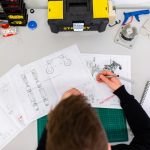Jump To:
Resources
Author Info
Catherine A. Hensley
Chemical Technician
Los Alamos National Laboratory
Los Alamos, NM
(Original article by Marcie H. Fuerschbach, Electrical Engineering Technician, Sandia National Laboratories; now with Southwest Airlines)
What is a lab technician?
A lab technician is someone who has learned the practical details and special techniques that are required in a modern scientific laboratory. Lab technicians can be found in such diverse fields as electronics, mechanics, biology, chemistry, and metallurgy. Computer technicians usually go to the computers rather than bringing them to a lab to work on.
Lab technicians generally work with scientists and engineers, running experiments, conducting research projects that can result in new ideas and expand our scientific knowledge, or running routine diagnostic samples. Thus, lab technicians contribute to the scientific teamwork responsible for the many new developments, products, and breakthroughs that are seen from day to day and taken for granted by all.
What makes a good lab technician?
To be a good lab technician certain qualities are needed. You should be able to work well with others. Many projects are worked on jointly by a group consisting of a project leader, often an engineer, and other lab technicians. You should be willing and able to voice your opinion and to volunteer your ideas to help the group meet its ultimate goal. You must also have the initiative to work on a project that might be assigned only to you. Determination and patience are often needed to meet schedules and solve problems that present obstacles. You should also have the patience to run the same or similar tests over and over again for routine samples.
What is life as a lab technician like?
What you do on the job depends greatly on your field of specialty. For example, if you are an electronics technician, you might take a circuit design, gather all the necessary components or parts, build the circuit, test it, and troubleshoot the circuit if it is not working. After the circuit works, you would do the necessary checkouts of the circuit—electrical continuity, environmental tests such as temperature cycling and air gun shock tests, and any required calibrations. A typical project for a mechanical technician might be to take a design for a scientific apparatus, prepare the necessary mechanical drawings, set up the apparatus, test to make sure it performs the required function, and make any needed modifications.
Research on a project can sometimes be long and tedious. But after the project is complete and you have achieved your goal, the feeling of satisfaction you have is very rewarding.
How do I become a lab technician?
Lab technicians in any field need at least a two-year associate degree and, increasingly, a bachelor’s degree. Associate degrees are offered at many institutions such as junior colleges, community colleges, many four-year colleges, and private technical schools. To become a scientist or engineer, you almost always need a more advanced degree.
Northern New Mexico Community College offers a program sponsored by Intel to train wafer fabrication technicians. UNM-Los Alamos offers several programs to train chemical technicians, radiation control technicians, and others. The Technical Vocational Institute in Albuquerque has similar courses, as well as several to train hospital technicians, electronics technicians, and others.
Take as much mathematics as possible in both high school and in your further training. In order to solve many technical problems, advanced mathematics can be necessary. Computer science is also needed; the computer is very commonplace in scientific laboratories today as a tool in analyzing data, solving problems, or plotting graphs. Take science courses. These courses contain many of the basic theories you will need later to understand the research projects you are working on.
What/where are the jobs?
The demand for lab technicians is always increasing. Employment can be found in hospitals, food packing companies, and sanitation plants, as well as in private and government laboratories. The computer industry has created whole new categories of technicians, such as wafer fabrication technicians, who are hired by chip manufacturing plants.


